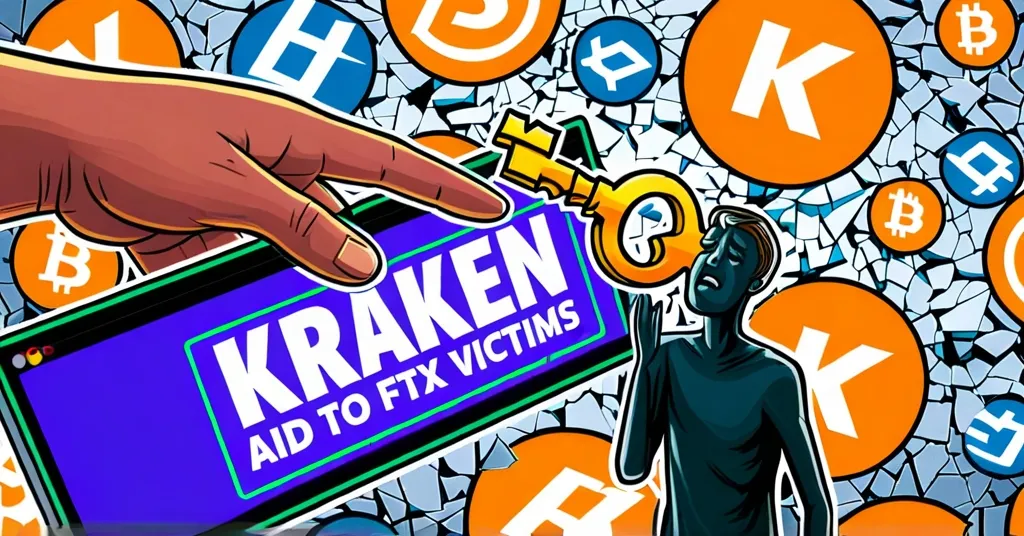Kraken’s $50k Fee-Free Trading Offer Aids FTX Victims in Recovery

Kraken Offers Lifeline to FTX Victims with $50k Fee-Free Trading Incentive
Kraken is extending a helping hand to former FTX clients with up to $50,000 in fee-free trading incentives as part of its initiative to distribute recovery funds following the collapse of FTX.
- Kraken offers $50,000 in fee-free trading and $105 in credits to former FTX clients.
- FTX recovery funds distribution begins in January with Kraken and BitGo.
- FTX’s bankruptcy was due to fraud and mismanagement; Sam Bankman-Fried sentenced to 25 years.
In the aftermath of FTX’s collapse, Kraken is stepping up to support affected investors by offering a substantial relief package. Former clients of FTX can now trade up to $50,000 in cryptocurrency on Kraken Pro without incurring any trading fees. In addition, these clients will receive up to $105 in trading fee credits, providing a further cushion to help them recover from their losses.
Fee-free trading means that when you buy or sell cryptocurrencies on Kraken Pro, you won’t have to pay the usual transaction fees that exchanges charge. This incentive is Kraken’s way of rolling out the welcome mat for those impacted by the FTX debacle, aiming to rebuild trust and attract investors to their platform. The additional credits can be used to offset future trading fees, making it even more appealing for those looking to continue their crypto journey.
The distribution of recovery funds, a joint effort between Kraken and BitGo, is set to begin in January, with the first payouts anticipated within 60 days. BitGo, known for its secure fund recovery services, is also offering a Bitcoin Giveaway Program for eligible U.S.-based FTX clients. This program gives participants a chance to win a full Bitcoin each quarter in 2025, adding another layer of potential recovery for those affected.
FTX, once a titan in the crypto world with a valuation of $32 billion, filed for bankruptcy in November 2022 amidst allegations of fraud and mismanagement. The fallout not only hit investors hard but also shook the confidence in centralized cryptocurrency exchanges. Sam Bankman-Fried, the mastermind behind FTX, was sentenced to 25 years in prison for orchestrating multiple fraudulent schemes, including defrauding customers and investors. His sister company, Alameda Research, was also implicated in the scandal, further highlighting the need for stronger security measures and regulatory oversight in the crypto industry.
The collapse of FTX has sparked a broader conversation about the principles of decentralization, privacy, and disrupting the status quo. While Kraken’s offer is a centralized solution, it underscores the importance of having robust alternatives in the crypto ecosystem. Decentralization means that the control of the network is distributed among many participants rather than being controlled by a single entity, which can help prevent the kind of fraud seen at FTX. This incident is a stark reminder that even in the face of adversity, the industry continues to innovate and support its users.
Effective accelerationism, or e/acc, is evident in the rapid response to FTX’s collapse. Kraken and BitGo are not just reacting; they’re accelerating the recovery process, showing that technological and financial innovations can drive progress even after significant setbacks. This approach emphasizes the potential for positive change and growth within the crypto space.
While bitcoin maximalists might argue that such events highlight the need for sticking to the original cryptocurrency, it’s important to acknowledge the roles that altcoins and other blockchains play. Ethereum and other protocols fill niches that bitcoin might not, contributing to the broader financial revolution. Bitcoin maximalism is the belief that bitcoin is the only cryptocurrency that matters, but the reality is that diversity in blockchain technology can lead to a more resilient and innovative ecosystem.
Counterpoints to Kraken’s offer include concerns about moving from one centralized exchange to another. Some might argue that this doesn’t address the root issues of centralization and that true recovery should focus on promoting decentralized solutions. Additionally, while Kraken’s incentives are generous, they won’t undo the damage done by FTX’s collapse. Investors must remain vigilant against scammers and unrealistic price predictions, which continue to plague the industry.
As we navigate these turbulent waters, it’s crucial to remain optimistic yet realistic. Kraken’s offer is a positive step, but it’s also a reminder of the risks inherent in the crypto world. The crypto industry’s resilience is akin to a phoenix rising from the ashes, but we must learn from the past to build a more secure and decentralized future.
“New clients who select Kraken to receive their FTX payout will get trading fee credits, allowing them to buy up to $50,000 in crypto on Kraken Pro with no trading fees.” – Kraken’s blog announcement.
The road ahead is uncertain, but one thing is clear: the crypto industry is resilient. As we embrace the future of finance, let’s not forget the lessons learned from the past. Kraken’s initiative is a testament to the community’s spirit of recovery and innovation, but it’s also a call to action for all of us to push for stronger regulatory frameworks and security measures.
Key Questions and Takeaways
What incentives is Kraken offering to former FTX clients?
Kraken is offering up to $50,000 in fee-free crypto trading on Kraken Pro and up to $105 in additional trading fee credits.
Which firms are involved in distributing FTX recovery funds?
Kraken and BitGo are involved in the distribution of FTX recovery funds.
When will the distribution of FTX recovery funds begin?
The distribution process starts in January, with the first payouts expected within 60 days.
What led to FTX’s bankruptcy?
FTX filed for bankruptcy amidst accusations of fraud and mismanagement involving the exchange and its sister company, Alameda Research.
What was the sentence for Sam Bankman-Fried?
Sam Bankman-Fried was sentenced to 25 years in prison for crimes including fraud and stealing user funds.



